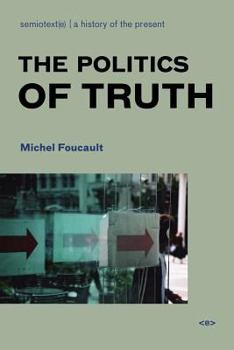The Politics of Truth, New Edition
(Part of the Semiotext(e) / Foreign Agents Series)
In 1784, the German newspaper Berlinische Monatsschrift asked its audience to reply to the question "What is Enlightenment?" Immanuel Kant took the opportunity to investigate the purported truths and assumptions of his age. Two hundred years later, Michel Foucault wrote a response to Kant's initial essay, positioning Kant as the initiator of the discourse and critique of modernity. The Politics of Truth takes this initial encounter between Foucault and Kant, as a framework for its selection of unpublished essays and transcripts of lectures Foucault gave in America and France between 1978 and 1984, the year of his death. Ranging from reflections on the Enlightenment and revolution to a consideration of the Frankfurt School, this collection offers insight into the topics preoccupying Foucault as he worked on what would be his last body of published work, the three-volume History of Sexuality. It also offers what is in a sense the most "American" moment of Foucault's thinking, for it was in America that he realized the necessity of tying his own thought to that of the Frankfurt School.






